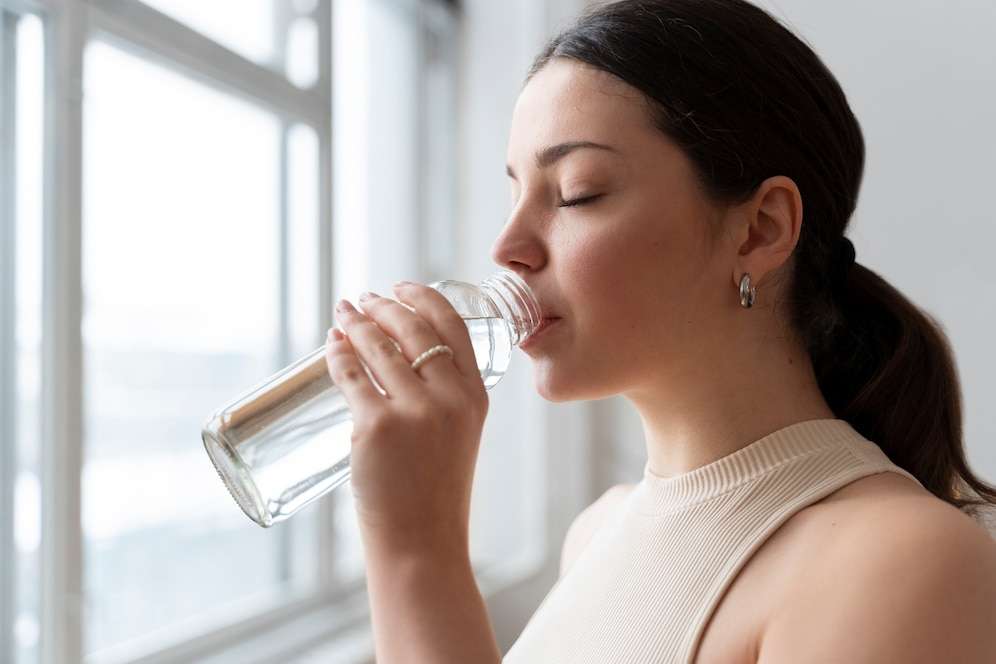Water therapy is a popular weight loss method that involves consuming a significant amount of water throughout the day to aid in the body’s natural weight loss processes.
Introduction
Water is as important for our body as the carbohydrates, proteins and fats. Water is essential for living and comprises of 70 percent of the body weight. Drinking adequate amount of water daily helps the body to flush out the toxins, which prevents from various diseases. Water is one of the most import element of our diet and a natural way to keep ourselves fit. It can help in keeping the gut healthy and shedding extra weight.
Though weight loss completely depends on lifestyle, diet and exercise, water contributes in the process by improving metabolism ad removing toxins. Water therapy is also known as hydrotherapy. It is a natural method of healthcare, which includes the use of water to improve health and well-being. It has been used for centuries for managing various health issues, such as constipation, obesity and arthritis.
Benefits of water therapy for weight loss
Boosts metabolism
Drinking adequate amounts of water can boost body metabolism. According to research studies, drinking causes acute changes in the cardiovascular regulation. Drinking water has shown to increase the energy expenditure, which is mediated through activation of the sympathetic nervous system. This increases the metabolic rate , that is also known as thermogenesis, which increases the daily energy expenditure.
Eliminate toxins

Staying hydrated is essential for the human body. It is recommended to drink at least eight glasses of water daily. Drinking adequate water daily helps in removing the waste materials from the body. It also raises the metabolic rate and helps in burning more calories. According to research studies, about half a litre (17 ounces) of water can increase the metabolic rate upto 30% for an hour approximately.
Promotes digestion
Water is essential for digestion of the food we eat. According to Mayo Clinic, the food is broken down with the help of water, which further helps in absorption of the nutrients by the body. The small and large intestines absorb water to solidify the stools. The water receptors present in the colon pull water from the body, making the stools softer. Lack of water in the body leads to dry hard stools, leading to constipation and abdominal cramps.
Prevents dehydration
According to the Centres of Disease Control and Prevention, body fluids are lost in a hot sunny day, sweating, illness or fever. These conditions demand more drinking water. It is essential to replenish the lost fluids to maintain the regular activity of the body. Lack of water in the body leads to dehydration, complimenting many other illness.
Understanding the science behind water therapy for weight loss

It is true that drinking excessive amount of water for a day will not make you weigh lighter. Drinking more water with appropriate diet and exercises do contribute to weight management. Water, which is essential for all body functions, is a calorie-free liquid. It hydrates and provides energy to the body by transferring nutrients from the foods into the cells.
Scientifically, water can contribute to weight maintenance by improving metabolism, suppressing appetite, utilising nutrients in the body and, making exercising easier. Drinking more water or a glass of water 15 to 30 minutes before every meal has a filling effect. It takes up the space in the stomach and keeps little place for food. Research studies have shown that individuals who drink water before food, have 13% chances of eating less food. Further, eating slowing, with a 15 minute eating window and breaks between meals and snacks reduces calorie intake.
A. Role of water in the body
- Temperature regulation: Water helps in regulating body temperature through sweating and evaporation. It is one of the crucial functions of water in our body. It cools the body, by preventing overheating during physical activity or in hot environments.
- Hydration: Water helps in maintaining hydration in the body. Hydration is essential to function important functions, such as digestion, facilitating absorption of nutrients, and controlling body temperature to normal.
- Transport of nutrients: Essential vitamins, minerals, and nutrients are carried throughout the body by water. It facilitates the distribution of these nutrients to cells and tissues and their absorption.
- Elimination of body wastes: Water aids in expelling the body’s toxins and wastes through urine and sweat. It maintains healthy kidney function and promotes bowel movements, preventing constipation.
- Cushioning and lubrication of joints: Water works as a lubricant for joints, promoting fluid movement and reducing friction. Additionally, it protects vital organs from trauma by cushioning and absorbing shock.
- Functioning of cells: Water facilitates various cellular functions, such as metabolism, chemical reactions, and the transportation of nutrients across cell membranes. It supports cellular activity and aids in maintaining cell structure.
- Brain and nervous system function: Proper hydration is important for optimal brain function and cognitive performance. Water helps maintain the balance of electrolytes, which are essential for nerve signaling and overall nervous system function.
- Digestion and nutrient absorption: Water is essential for breaking down food, aiding in digestion, and absorbing nutrients from the digestive tract. It supports the production of digestive enzymes and helps prevent issues like constipation.
- Skin health: Adequate hydration contributes to healthy skin by promoting elasticity, preventing dryness, and maintaining a glowing complexion. Water helps flush out toxins and can improve the appearance of skin.
B. How water therapy promotes weight loss
Water therapy, also known as water consumption therapy or water diet, is often known as a method to promote weight loss. Incorporating water into a weight loss plan promotes effective weight loss rather than depending only on water for weight loss. It can be beneficial in the given ways.
- Increased hydration: Hydration in essential for overall health and well-being. Drinking sufficient water facilitates effective hydration. When properly hydrated, our body functions optimally, including digestion and metabolism. Staying hydrated help to curb cravings. It also reduces the likelihood of mistaking thirst for hunger.
- Calorie-free beverage: Water is a calorie-free beverage that makes a great substitution for sweet beverages like soda, juice, or energy drinks. You can gradually lose weight by consuming less calories overall by substituting water for high-calorie beverages.
- Enhanced satiety: Before or during meals, drinking water can induce fullness, which will cause you to eat less. Additionally, drinking water with meals may cause you to eat more slowly and help your brain more efficiently detect fullness.
- Increased metabolism: While consuming water alone won’t considerably speed up metabolism, while maintaining proper hydration encourages a healthy metabolism. Ensuring appropriate hydration can maintain a healthy metabolic rate as dehydration hinders metabolic activities.
- Improved exercise performance: Water is essential for exercise and physical activity. Exercise performance and endurance can be enhanced by staying hydrated, enabling to do longer and more intense workouts. It promotes calorie burning and thus, aids weight loss.
C. How much water to drink for weight loss
- The amount of water that a person should drink to lose weight depends on their age, weight, level of exercise, and overall health. However, it is generally advised to consume at least eight 8-ounce glasses of water every day, or around 2 liters or half a gallon.
- If you are seeking to reduce weight, it may be beneficial to drink more amount of water. According to some experts, increase your water intake to 1-2 liters each day, or possibly more if you are physically active or live in a hot climate. A feeling of fullness that results from drinking water before to meals may encourage calorie reduction.
- These are only recommendations as each person’s requirements for water may vary. Due to factors including sweat loss, humidity, and particular medical conditions, your water intake may need to be modified according to your need. Knowing when you’re thirsty and maintaining light yellow urine are probably appropriate indicators that you’re getting enough water.
- Although drinking water is important for overall health and can help with weight loss, it should be noted that it cannot replace a balanced diet, regular exercise, and other healthy lifestyle habits. Based on your particular needs, a qualified dietician or healthcare professional can give you with tailored guidance on hydration and weight-loss approaches.
D. Best time to drink water for weight loss
There is no such thing as the best time of day to drink water for weight loss. Doing so all day can be beneficial. Here are some recommendations:
- Before starting the day, have a glass of water to replenish your body after the previous night’s fast. Your metabolism will be boosted, and your body will be ready for the day.
- Aim to drink water regularly throughout the day to keep yourself hydrated. Water therapy can improve digestion, keep you fully hydrated, and reduce hunger. Drink water between meals and whenever you feel thirsty.
- Before meals, drinking water can help you feel more satisfied and may even help you eat less food overall.
- To stay hydrated and support your best possible physical performance, drink water before, during, and after your workouts. Sweating increases during exercise because more fluid must be consumed to replenish lost water.
- Whenever you feel thirsty, sip on some water while paying attention to your body’s signals. Your body interprets thirst as a signal to hydrate.
- Remember that a thorough water therapy weight reduction plan should include drinking water in addition to a balanced diet, regular exercise, and good lifestyle decisions. Drinking water can aid in overall hydration, appetite suppression, and metabolic health, yet it cannot guarantee weight loss.
- Depending on your needs and preferences, a qualified dietician or healthcare professional might offer specific recommendations on hydration and weight loss techniques.
Tips for successful water therapy for weight loss
A. Listen to your body
When you decide to undergo water therapy consider the factors of our water intake requirements. Consider variables, such as your weight, daily activity, the climate, and general health. You should adjust your water intake based on your unique needs.
B. Use a reusable water bottle
Keep a water bottle with you at every time to serve as a reminder to sip water frequently. It would be simpler to stay hydrated and reach your daily intake target if it is easily available.
C. Drinking water before meals
Drinking water before meals make you feel fuller before you eat. This may facilitate portion control by lowering calorie consumption during meals. It also promotes digestion and better digestive health.
D. Say no to sugary beverages
Sugary beverages are high in calorie, which promotes weight gain. Water should be substituted for sugary and high-calorie beverages including soda, energy drinks, and sweetened juices. Your overall calorie consumption can be greatly decreased by choosing water instead of calorie-dense beverages.
E. Flavour your water with natural ingredients
If you find plain water unappealing, try adding some citrus juice, cucumber slices, or natural flavourings like mint or berries. This can improve the flavour of water without adding a lot of calories.
F. Consistency
For water therapy to be effective, consistency is essential. Instead of attempting to drink a lot of water all at once, try to consistently drink water throughout the day.
G. Set a goal
Keeping a track of water intake will help you to consume sufficient amount of water. Set a particular target for how much water you intend to consume each day.
Precautions and considerations
Identify your needs
Water requirements can vary depending on factors such as age, weight, activity level, climate, and overall health. What works for one person may not work for another. It’s essential to consider your specific needs and consult with a healthcare professional or registered dietitian for personalized guidance.
Avoid overhydration
While staying properly hydrated is important, excessive water intake can be harmful. Drinking an excessive amount of water within a short period can lead to a condition called hyponatremia, which is low blood sodium levels. This can be dangerous and potentially life-threatening. Avoid overhydrating and aim for a balanced approach.
Underlying medical conditions
Some medical conditions, such as kidney problems or heart conditions, may require specific considerations for water intake. Certain medications may also influence fluid balance in the body. It’s crucial to discuss water therapy with your healthcare provider if you have any underlying health conditions or take medications that may affect your water balance.
Consider other foods and fruits
While water is an essential source of hydration, other fluids and foods also contribute to your overall fluid intake. Fruits, vegetables, soups, and herbal teas can provide additional hydration. Consider incorporating a variety of hydrating options into your diet.
Balance water intake with electrolytes
Adequate electrolyte balance is important for proper body function. While water is essential, consuming solely water without replenishing electrolytes (such as sodium, potassium, and magnesium) can lead to an imbalance. Consider including electrolyte-rich foods or beverages, or consult a healthcare professional if you are engaging in prolonged water therapy.
Consider lifestyle factors
Individual circumstances, such as intense physical activity, hot weather, or excessive sweating, may increase your water needs. Adjust your water intake accordingly to accommodate these factors.
alance with a healthy diet: Water therapy should complement a balanced diet that includes a variety of nutrients. Relying solely on water consumption for weight loss without proper nutrition may lead to nutrient deficiencies.
Balance with a healthy diet
Water therapy should complement a balanced diet that includes a variety of nutrients. Relying solely on water consumption for weight loss without proper nutrition may lead to nutrient deficiencies.
Listen to your body
Pay attention to your body’s thirst cues and drink water when you feel thirsty. Additionally, consider overall hunger and fullness cues to differentiate between thirst and hunger.
Conclusion
It’s important to note that water therapy should be seen as a complementary approach to a comprehensive weight loss plan that includes a balanced diet, regular exercise, and lifestyle modifications. While water therapy can have potential benefits for weight loss, it’s not a magic solution on its own. Consulting with a healthcare professional or registered dietitian is recommended for personalized advice and guidance on weight loss strategies.




